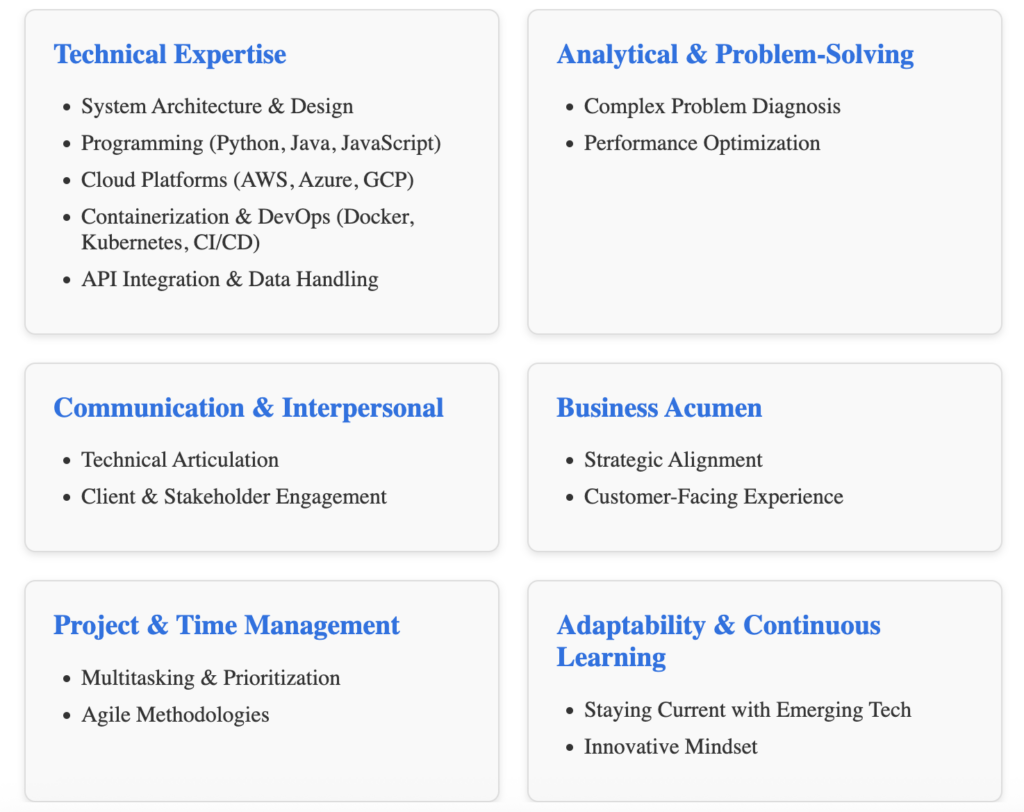A Solutions Engineer, also known as a Pre-sales Engineer, Technical Sales Engineer, or Sales Engineer, is a specialized professional who is kind of a part of the sales department but also has technical expertise and is able to translate complicated technical details into clear, simple explanations, ensuring clients understand and feel confident that the solution will work well for their business.
This role grew tremendously in the last decade, to more than 125,000 engineers working in the US. The hiring rate for this position is expected to grow by 6% through 2032, driven by increasingly complex technologies and higher customer expectations for personalized solutions.
These professionals help clients communicate their needs to the technical team and ensure the proposed solutions meet their requirements and expectations. Solution engineers (SEs) also help the sales team convey the technical aspects of the product or service clearly and compellingly to potential customers.
They speed up the pre-sales process by bridging the gap between technical specifications and customer benefits. No wonder they are in demand.
In this article, we will explain the roles and responsibilities of an SE, how it differs from a software engineer, the different types of SEs, the skills and qualifications for this role, and the average salary.
What is a Solutions Engineer?
A Solutions Engineer is an IT professional who connects complex business problems with technical solutions. These specialists act as technical support to a sales team and have a solid knowledge of technology products and architecture. They also have the ability to communicate efficiently with stakeholders.
SEs know how to identify customers’ needs, design systems or services to meet those demands and present these solutions convincingly.
They add value, keep things realistic, and ensure that the solution fits the client.
What is the Difference Between a Solutions Engineer and a Software Engineer?
The main difference between a solutions engineer vs. software engineer is client interactions.
Solutions engineering is a client-facing role that involves demoing/showing customers the value of a product. Software engineering, on the other hand, involves writing code for a module/product that is rarely presented to a customer.
However, depending on the organization, a solutions engineer may also write code and perform some developer tasks. Their main objective is to ensure the happiness of every stakeholder, especially the customers.
Solutions Engineer: Key Responsibilities
The roles of a solutions engineer will vary by company. However, below is a general overview of the typical duties of an SE:
1. Providing Detailed Specifications
Each individual software solution has several specifications, which often include scope, cost, and time.
Solutions engineers determine and provide these specifications to the relevant parties. This increases the chances of a successful solution and a satisfied client. SEs usually ensure they include every detail in the specification document.
2. Technology Analysis
SEs spend a huge chunk of their time analyzing clients’ current software and technology. This analysis enables them to discover areas for improvement and develop implementation solutions.
Solutions engineers also study the software and technology of other companies to keep up with the latest trends and innovations.
3. Testing Software
These specialists test the performance of a suggested software program before transfer and after installation. This way, they can identify and fix bugs. Also, testing the software before handing it over to the client is cost-effective because it reduces the need for a rework
4. Project Management
While solutions engineers aren’t project managers, they still need to track a project’s progress. These professionals oversee the development of the client’s solutions to ensure they are ready for delivery at the set date. This can include setting timelines, coordinating other department engineers, and ensuring the project stays within budget.
5. Liaising with Clients
Solutions engineers are among the client-facing employees of the company. They enable smooth communication between customers and other department engineers to create and deliver solutions. They liaise with clients virtually or onsite to understand their requirements and help them develop a proposed solution.
6. Collaborating with Other Engineers
A solutions engineer’s job heavily involves interacting with different stakeholders, including other engineers.
Since they have the best understanding of the client’s requirements, they can effectively communicate them to other engineers, resulting in solutions that satisfy all the client’s demands.
7. Maintaining Relationships
A SE’s job doesn’t end after a sale. They must remain in contact with the client throughout the client’s journey.
After purchasing the solution or service, the customer may require technical support or help with implementation. So, a solutions engineer must be reachable to offer this assistance.
Plus, maintaining this relationship also creates an opportunity to generate recurring business with the client.
Daily Activities
The daily tasks of a solutions engineer will depend on the company, the project, and the stage of the sales process. That being said, here’s what a typical day in the life of an SE would look like:
Start the day by reviewing project goals, coordinating with team members, and planning their tasks. A solution engineer aligns priorities with ongoing projects and sets clear objectives to drive efficiency.
Engage in meetings with clients and internal stakeholders to discuss project requirements, updates, and deliverables. Clear communication is key to understanding needs and ensuring successful outcomes.
Tackle technical challenges by troubleshooting issues, providing effective solutions, and collaborating with technical teams. This critical role involves quick thinking and innovative problem-solving.
Focus on designing systems, developing prototypes, and implementing scalable solutions. This includes evaluating technologies, writing code, and ensuring that the solution meets both technical and business requirements.
Document processes, system designs, and project progress. Comprehensive documentation ensures transparency, aids future troubleshooting, and serves as a valuable resource for training and reference.
Dedicate time to staying updated with the latest technologies and industry trends. Continuous learning not only enhances skills but also fuels innovation, enabling solution engineers to bring cutting-edge solutions to the table.
Are There Types of Solutions Engineers?
Yes, there are different types of solutions engineers. Solutions engineering is a multifaceted field that caters to various industries and tech domains. So, different types of SEs focus on distinct aspects of technology and business.
The following are the types of solutions engineers you should know about:
Pre-Sales Solutions Engineer
These specialists are the technical support of the sales team, and play a critical role in the sales process.
They understand their company’s products or services inside out and have the technical capabilities to articulate their benefits to the client’s business.
Pre-sales solutions engineers work closely with sales representatives to explain the value proposition of their offerings, customize demos, and address any technical objections that may arise.
Post-Sales Solutions Engineer
Also known as Customer Success Engineers, Post-sales Solutions Engineers focus on the customer’s after-sales experience. Their primary objective is to ensure the successful implementation, adoption, and optimization of the provided solutions.
They offer technical support and training to help customers achieve their desired outcomes and gain a return on their investments.
Their efforts improve customer satisfaction and loyalty, increasing the chance for retention and future upsells.
Technical Solutions Engineer
Technical solutions engineers have an in-depth knowledge of the technical details and how the products work. They usually focus on developing and tailoring technical solutions for clients’ complex requirements.
Technical solutions engineers must have a solid background in engineering or computer science, which enables them to troubleshoot and provide expert advice and support.
Cloud Solutions Engineer
Cloud solutions engineers, as the name suggests, major in cloud technologies and services. They assist businesses with cloud migration, optimization, and using cloud services to scale, be flexible, and become cost-efficient.
These engineers are knowledgeable about cloud platforms, such as Azure, AWS, and Google Cloud. They work with clients to develop and adopt cloud-based solutions to meet their unique business needs.
Industry-Specific Solutions Engineer
This type of solutions engineer has specialized expertise in a particular sector, such as healthcare, finance, or manufacturing. They are familiar with the business processes, regulations, and unique challenges of their chosen industry. As a result, they can offer specialized solutions that meet industry standards.
Industry-specific solutions engineers will have more than a deep technical knowledge of the product. They must also have strategic insights into how these solutions can result in industry-specific outcomes and improvements.
Security Solutions Engineer
Security solutions engineers handle the cybersecurity component within an organization’s tech stack. They design and implement security solutions that protect against vulnerabilities, threats, and compliance issues.
These specialists possess knowledge of intrusion detection systems, firewalls, encryptions, and more security protocols. Security solutions engineers ensure that data and systems are protected by following best practices and ensuring that the security architecture is robust.
Ideal Skills and Qualifications

When recruiting a top-notch Solution Engineer, we look for candidates who combine deep technical expertise with strategic problem-solving and excellent communication skills. Here are the specific skills and attributes that make an ideal Solution Engineer:
1. Technical Expertise:
- Demonstrated ability to design and implement scalable, secure, and efficient system architectures.
- Strong coding skills in one or more relevant languages (e.g., Python, Java, JavaScript) and familiarity with modern development frameworks.
- Hands-on experience with cloud services (AWS, Azure, or Google Cloud) to architect, deploy, and manage applications in a cloud environment.
- Proficiency with Docker, Kubernetes, and CI/CD pipelines to streamline deployment and manage microservices effectively.
- Solid understanding of RESTful API design, data integration techniques, and experience working with various databases.
2. Analytical & Problem-Solving Skills:
- Ability to break down multifaceted business requirements and design tailored technical solutions.
- Experience in identifying bottlenecks and implementing improvements to boost system performance and reliability.
3. Communication & Interpersonal Skills:
- Excellent verbal and written communication skills to translate complex technical details into business-friendly language.
- Ability to manage client expectations, conduct persuasive presentations, and collaborate with cross-functional teams.
4. Business Acumen:
- Understanding how technical solutions drive business objectives, ensuring that proposed solutions deliver tangible value.
- Experience in pre-sales or consultative roles, where building trust and rapport is essential.
5. Project & Time Management:
- Proven track record in managing multiple projects simultaneously while consistently meeting deadlines.
- Familiarity with Agile practices to promote continuous improvement and efficient project execution.
6. Adaptability & Continuous Learning:
- A passion for keeping up-to-date with emerging technologies and industry trends, along with a willingness to pursue relevant certifications.
- A proactive approach to learning and applying new skills to solve complex technical challenges.
By seeking out candidates who excel in these areas, we ensure that our Solution Engineers are not only technically sound but also capable of driving business success through innovative, well-integrated solutions.
Educational Qualifications
There is no formal solutions engineering degree. Prospective SEs, however, need to obtain a Bachelor’s degree in computer science, electrical, or software engineering. This helps in gaining more knowledge of different software systems.
Gaining work experience in related IT (Information Technology) roles, such as desktop support officer or technical support analyst, can be a good option for acquiring transferable skills.
Aspiring solutions engineers can also gain knowledge via several industry certifications, including:
- Microsoft Certified Solutions Associate (MCSA)
- AWS Certified Solutions Architect – Associate
- Certified Information Technology Professional (CITP)
- Engineer In Training Certification (EIT)
- Google Cloud Certified Professional Architect
- CCNP Service Provider Operations (CCNP)
- CISCO Certified Network Professional (CCNP) Enterprise
Average Salary of a Solutions Engineer
According to Talent.com, the average salary of a solutions engineer in the United States is $131,548. That amount is higher in states like Louisiana ($153,735), Virginia ($152,723), Maryland ($151,000), California ($144,758), and Washington ($142,405).
However, if this amount goes down significantly if you are hiring remotely. Hiring a remote solutions engineer gives you access to talent across the world and allows you to save costs. For example, the average salary of a solutions engineer in Latin American countries like Mexico and Argentina is between $43,723-$60,000 per year.
In Eastern European countries like Poland and Bulgaria, you can expect to pay $40,524 and $62,475 annually.
Conclusion
Solutions engineers are like the glue that holds everything together, especially in technology companies. These professionals support customers throughout the sales lifecycle, ensuring they get maximum value for their money.
SEs also make the lives of the sales and other engineering teams easier by bridging the gap between the customers’ needs and the company’s products or services.
However, finding a quality solutions engineer is easier said than done, as there is no clear path to becoming one.
That’s where we come in. At DistantJob, we help tech companies recruit the best talents, including top-tier solutions engineers. Our innovative approach to recruitment helps us match qualified IT professionals to the right companies. Book a call today with us and find more!





